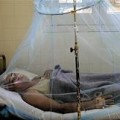In Malaysia, more than 20,000 people caught dengue fever in the first five months of this year, 50 percent more than in the same period a year earlier. Forty-eight people died of the disease, an increase in mortality of about 70 percent compared to 2006. Dengue fever is also on the rise in Vietnam and Thailand. Singapore reported almost 3,000 dengue cases in the first half of this year, more than twice as many as in the same period last year.
In Cambodia, the disease killed at least 109 children this year - three times as many as in the first half of 2006. Ngan Chantha, director of Cambodia's national anti-dengue fever program, fears the death toll could rise even more in coming months. Chantha says he is worried because it is only June, and dengue fever usually peaks at the height of the rainy season in July and August.
Dengue is a viral disease transmitted mainly by a type of mosquito common in Southeast Asia. Patients suffer from high fever, nausea and intense joint pain. In severe cases, the disease can be fatal.
The earlier-than-usual arrival of the rainy season in parts of the region this year is partly to blame for the increase in dengue cases. The growth of cities across the tropics is another cause.
The mosquitoes that carry the disease usually breed in containers filled with rainwater, such as discarded plastic bottles or tires. In Southeast Asia's rapidly growing cities with sprawling construction sites and garbage dumps, mosquitoes find ample breeding ground. Steven Bjorge is an epidemiologist for the World Health Organization in Indonesia. He says increased migration into urban centers has increased the frequency of outbreaks. Migrants, unlike people born in the city, have not built up an immune system to different strains of the virus.
"In Jakarta, a city of 12 million people, there is a lot of in-migration from rural areas of Java, Bali and Sumatra and in many cases, those people are not immune so they provide the place that another epidemic could get started," said Bjorge. Bjorge says travel also spreads the disease. One or two infected tourists traveling to the Maldives, for example, could cause a small epidemic there if mosquitoes that transmit the disease bite them.
There is no treatment or vaccine for dengue fever. The only way to prevent it is to remove the mosquitoes' breeding grounds.

